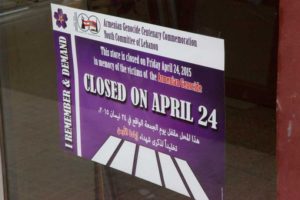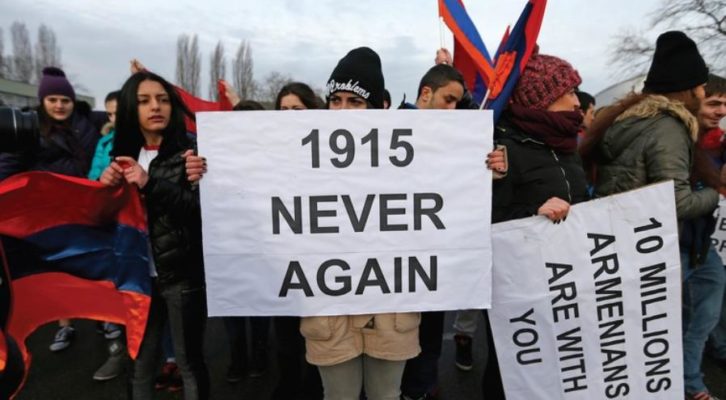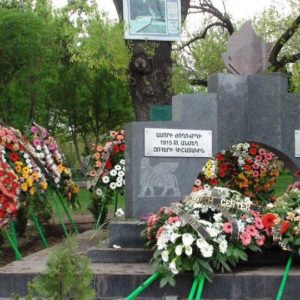Hundreds of red lanterns glowed as they rose into the sky, watched by the crowds below until they disappeared behind the buildings that dot the fringes of the Lebanese coastline. The event is one of many building up to April 24th, which marks the 100th commemoration of the Armenian genocide at the hands of the Ottoman Empire.
Beirut is a vibrant hub of Armenian political and social culture and is home to many of Lebanon’s 156,000 Armenians — nearly 4% of Lebanon’s population of 4 million. The city is expected to play a major role in the diaspora’s centenary commemoration of the genocide.
In the waning days of the Ottoman Empire, at the height of World War I, nearly 1.5 million Armenians, as well as a number of other minority groups including Assyrian Christians and Ottoman Greeks, were subject to a brutal campaign of organized killing, starvation, and forced deportation.
But Turkey has refused to recognize the events of 1915 as genocide. This refusal has become the focus of Armenian commemorations of the massacre year after year.
For Armenian community activist Yeghia Tashijian, one of the main obstacles to Turkey’s recognition boils down to the money. Besides the territorial claims that Armenians have made over lands that are now in eastern Turkey, they have demanded reparations for the families of those killed. These demands make Turkey’s recognition not only politically complex, but also potentially very costly for the country.
But Tashijian says he sees the tide changing in the views of Turkish people. “Ten years ago, it was much more difficult. There was denial by the government and the society in Turkey, but now there are many people who openly talk about this issue,” he told The Media Line. And with voices of support from international powerhouses like Pope Francis and American pop icon Kim Kardashian, it seems the calls for recognition are becoming even louder.
There are a number of cultural and historical events, including talks, seminars and concerts to mark the occasion in Lebanon. The main focus is the march by thousands of Armenians and other Lebanese on April 24 from Antelias, an area north of Beirut, into the heart of the capital to commemorate the genocide.

Photo: Alex Young/The Media Line
Tashijian says Beirut has played an important role in Armenian activism since the Soviet era. Then, when Armenia was not yet an independent state and could not express its identity, Beirut was the ideological capital of the Armenian people.
Under Lebanon’s confessional system, in which 18 different religious sects are represented, Armenians have found safety and opportunities to express their identity. In neighborhoods throughout Beirut, shopkeepers chat in the western Armenian language — which UNESCO considers an endangered tongue. Haigazian University, the only Armenian University in the diaspora, is a bastion for Armenian activists and professors.
The role of the anniversary activities has changed over the years, according to Dr. Antranig Dakessian, Director of the Armenian Diaspora Research Center at Haigazian University. “[The event] has reshaped itself, it has transformed. Back in the 1920s ‘30s and ‘40s it was a mourning, but not anymore,” Dakessian told The Media Line, “Now, it is a revival.”
Today, the Armenian community in Lebanon use the commemoration as an opportunity to raise awareness about mass oppression and violence against any community, Dakessian said. “We try to promote justice and respect of ‘the other,’ acceptance and tolerance of ‘the other,’ and coexisting with them,” he said.
In a Middle East wreaked by violence and growing extremism, the message of tolerance and coexistence is a welcome one, Tashijian said.
“There are some politicians in the Middle East who do not recognize the Holocaust just because it happened to the Jews, but it is very important to change that. What happened then was a continuation of the Armenian genocide as is what is happening today in the Middle East and Africa,” he said.
For many Armenians, the genocide of 1915 is not a thing of the past. Lebanon is now hosting a number of Syrian Armenian refugees who have been forced to flee fighting in neighboring Syria. As jihadist groups like the Islamic State specifically target minority groups, Armenians and other minorities feel their presence in the Middle East is increasingly threatened.
But Lebanon — and perhaps Lebanon alone — remains a refuge for many fleeing persecution in the Middle East despite its own history of violence and sectarian conflict, most notably during its civil war from 1975-1990.
“Lebanon is the only harbor left for minorities in the region, and we don’t want to lose this. If we do, then everything is lost in the Middle East.







